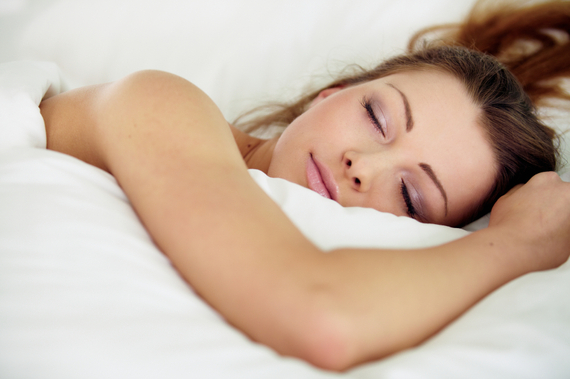Did you know that a good night's sleep is the secret ingredient to slimming down your waistline and boosting overall health? Lack of sleep causes hormone imbalances, specifically the hormones that manage hunger, appetite, and blood sugar levels. So when you don't get enough sleep, your hunger and appetite increases, leading you to eat more. But your body will also be less able to manage your blood sugar, making weight gain, inflammation, and diabetes more likely.
As a naturopathic doctor specializing in stress related conditions, I understand how critical sleep is for the health of my patients. Chronic stress, spurred on by lack of sleep, and cortisol (the stress hormone) affect the four core systems -- hormones, immune system, digestion, and nervous system. Research shows that when sleep is disrupted, cortisol levels are shifted away from optimal, perpetuating sleep issues by throwing off hormone levels and increasing inflammation. Therefore getting good sleep is one of the best things you can do for your health.
To help you achieve a good night's sleep for optimal health, please find some of my top tips, following:
•TIP 1: Maintain a regular bedtime and wake schedule, including on weekends.
•TIP 2: Plan on going to sleep by 10 p.m. (or nine hours before you have to wake up) when melatonin levels are optimal for sleep.
•TIP 3: Use the hour before bed for less stimulating activities (turn off the TV, iPad, and phones). You can also use glasses or an app on your computer to block blue light if you have to be exposed to light at night.
•TIP 4: Lower the lights because they stimulate hormones that wake you up. Make sure that your bedroom is completely dark, as well as cool, clean, and quiet.
•TIP 5: Avoid caffeine, and large amounts of food (especially sugar and carbohydrates) within three hours of bedtime, both of which can disrupt sleep.
•TIP 6: Support your body to lower cortisol with a product such as Stress-fix TM by Aveda. It is made with organic lavender and sage, and comes as a lotion, bath salts, and oil. Lavender has been shown to lower cortisol levels, which is what we all need for good sleep. Meditation, mindfulness, and yoga all also help lower cortisol levels when they are too high.
•TIP 7: Use an app such as Sleep Cycle to track your sleep and help you to identify wakefulness and sleep effectiveness. Then you can address any issues that you identify.
•TIP 8: Avoid alcohol and nicotine, especially late in the day. Although some people think alcohol helps with sleep, it actually disrupts sleep and leads to more nighttime awakenings.
•TIP 9: Do not spend too much time awake in bed. If you are not sleeping, get out of bed and do something else for a while.
•TIP 10: Sleep on a comfortable and clean mattress, bedding, and pillows. Make sure your mattress is supportive and that it has not exceeded its life expectancy of about 10 years.
